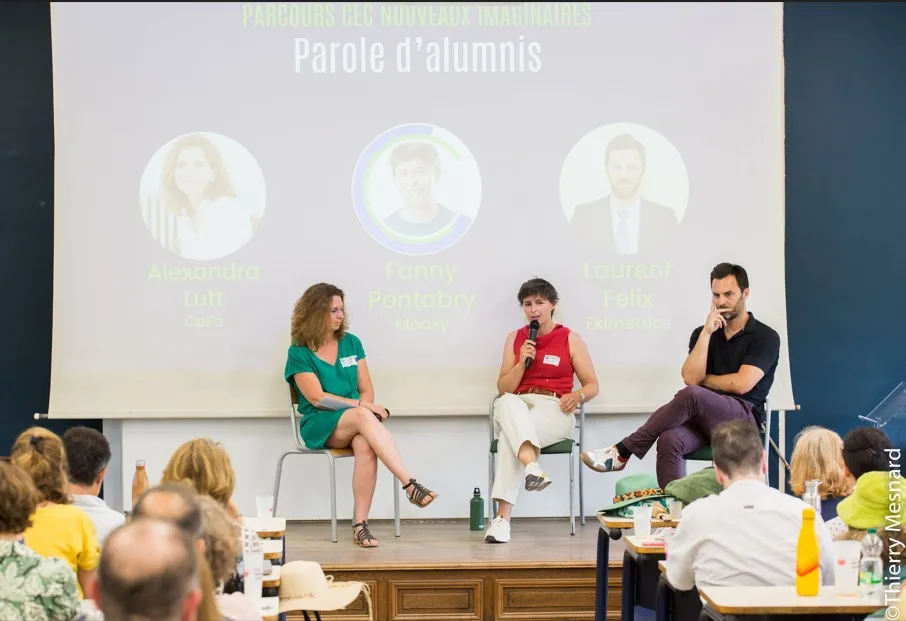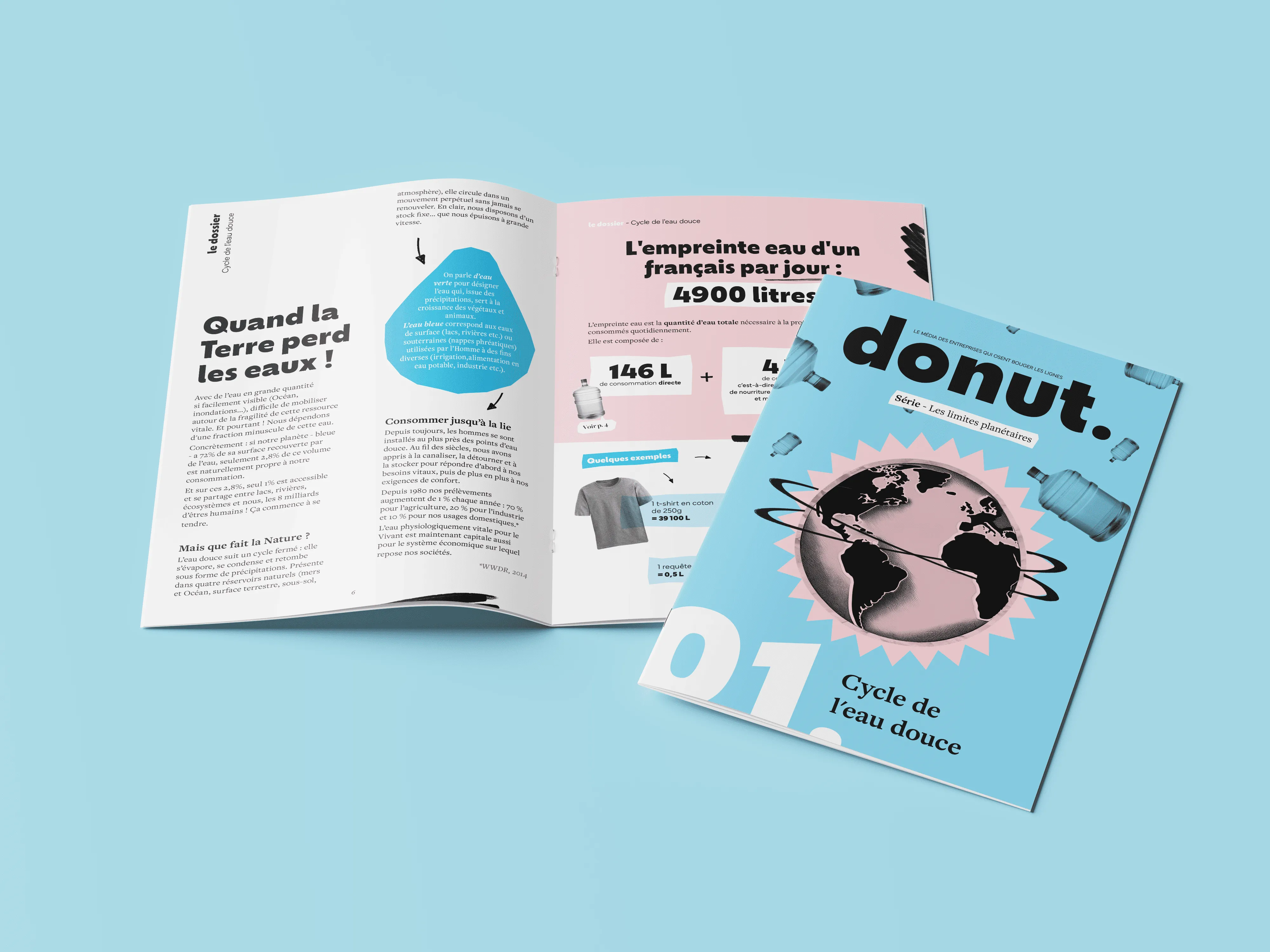Portrait of Fanny Pontabry, co-director of Mooxy, a committed communications agency
[Translation : EPALE France]

Can you introduce yourself and tell us about your career before you created Mooxy?
My name is Fanny Pontabry, I was born in Annecy and I’m 45. Initially, I trained as an engineer, so I never really intended to work in communications, but I soon branched out into event communications in Paris, then returned to Annecy to work on the bid for the 2018 Winter Olympics. Once this adventure was over, I set up my own company, Greentonic, so in fact I’ve been running my own business since 2012. At the same time, I did a Master’s degree in urban planning, because I like to learn about all sorts of things. For 8 years I worked as a freelancer on a whole range of subjects, including event communications.
At the same time, from 2013 to 2017, I led an ecovillage project in Annecy, a modern farm that, although it never saw the light of day, inspired me with the desire to forge links and create a place that brings people together. While working on this project, I discovered worker cooperatives and community-interest cooperatives, and it also allowed me to connect with a whole ecosystem of agroecology and third places, while continuing to work in event communication.
What made you want to create Mooxy, and how did the agency begin?
In 2020, with the arrival of COVID, together with the two people I regularly work with, Julie and Isabelle, with whom I had already set up a business called 3615 Sharon, we realised that we would be stronger and more resilient together. We thought about joining forces and I told them that if I set up a company, I would want it to be a cooperative, both because of the civic role of companies and because although when we set it up, there were three of us, the aim was to expand. We like the human side of things, sharing responsibilities and benefits. The organisation is not for sale, so it’s more of an anti-start-up. Mooxy was almost launched in September 2020 because that’s when we started marketing with our three entities while we tested our offer and our association, then we formalised our structure in August 2021.
Stepping into your office, we read “Mooxy, a creative and committed communications agency”. Last week, you appeared on BFM Climat, talking about concrete solutions for sustainable communications: how does Mooxy’s commitment manifest itself in the agency’s everyday activities, and what does it mean to communicate in a sustainable way?
Our approach is reflected in a roadmap drawn up during the Convention of Companies for the Climate (CEC), focusing on structural pillars. Right now we are a cooperative and our goal for the future is to become a cooperative of collective interest in order to include our customers as stakeholders.
This is also reflected in our business model, as we pool resources to create powerful tools that many customers need, particularly in the area of CSR, to engage employees and citizens alongside employees. It’s more about communication within the company ecosystem, we don’t do advertising.
Our third pillar is based on being strong technical experts, we know how to apply ecodesign, we support companies in avoiding greenwashing, which is something very subjective and for which we work with experts.
Alongside all this, we train ourselves in societal and environmental issues with webinars on planetary boundaries, fresks, and forward-looking tools for telling stories. Once we have done this for ourselves, we do it for our clients, acting as a lever for training and sharing these subjects. Our office is first and foremost a meeting place.
You took part in the CEC programme last year and are now part of the network’s alumni. What did you gain from the experience, both professionally and personally?
The CEC is the Convention of Companies for the Climate, which emerged following the Citizens’ Climate Convention on the initiative of Eric Duverger and Yannick Servan-Tercet, who felt that it was great to have done this for citizens but that there was still a major role to play for companies.
The aim was to get 150 companies on board, with at least two people per organisation, including a member of management. There was an initial session at national level, which was then rolled out at regional level. We organised the Alpes 2023 convention with 80 companies from the Alps region and 70 from the Lyon region, so 150 companies and 300 people in total with two group sessions. At that time, we were a very small company and we had written a lot of things down, but not everything was structured. The CEC came to help us create an ambitious roadmap with incredible energy because when you have a lot of companies that want to get moving, it creates a sense of emulation, a movement that carries you along. We were a young, agile company, so this helped us to implement our action plan. Today, our roadmap is our guiding light. It’s on our website, so people know what we really do.
The CEC was quite an overwhelming experience, it’s a real learning experience that certainly leaves its mark on participants, but it gives you the energy to change models by reflecting with other leaders from different sectors. I remember we were in base camps with 10 companies, so 20 people. When your base camp includes Airliquide, a construction company, architects and others who don’t know your model but who challenge you, it increases the desire to cooperate and share with others tenfold, and ultimately makes the roadmaps extremely ambitious.
For us, as a communications agency, it was confirmation that our profession is essential for transforming companies and changing models to achieve the desirable future that we want to bring about, even in situations where we might otherwise have been discouraged.
On a personal level, this journey has anchored everything I had imagined for this modern farm ecovillage, and all my existing commitments have been integrated into my role as a leader. Ultimately, it has reinforced my desire to say that when we talk about transition and transformation, it is possible, it is urgent and there is no other way.

On 26 February, the phasing out of 80% of companies subject to the Corporate Sustainability Reporting Directive (CRSD) was announced: to what extent could your business be impacted and, above all, how can you continue to move forward despite the situation?
It impacts our business; we have been preparing for this for a few months now to support companies in this new directive. Today, although it is no longer compulsory, there are still committed companies that will do it and they are the ones we are addressing. There will certainly be fewer means and resources in this area, but we will still be able to engage employees on environmental and social issues so as to prepare companies and managers to ensure that their companies will still be around in 10 or 15 years’ time.
We saw the CSRD not as a regulatory constraint but as an opportunity to anticipate crises and map the risks and benefits of each business. Not taking action because it is no longer mandatory is one thing, but not taking any action at all could be considered professional misconduct on the part of the manager. We continue to support companies in getting this message across, in raising awareness among their teams about environmental and social issues such as planetary boundaries, so that they can plan ahead.
What is your latest project?
In fact, since there is no longer a regulatory obligation, we decided to develop a communication tool, so we came up with a new media called Donut. The first version is a series on planetary boundaries to share information on these boundaries with all company employees, in both digital and paper format that contains an engagement kit, with stickers to get people involved in a fun and educational way.

This work DONUT is licensed under Creative Commons Attribution 4.0 International
Do you have a cultural resource to share? A book, podcast or film that has made a particular impression on you?
There is a show that really made an impression on me, “Radiolive vivante”, an extraordinary show that features live testimonies from people in war zones who tell you about their daily lives. It’s utterly amazing, riveting stuff. And above all, you realise that despite the situation they’re in, people still have that zest for life.
There is also a book that I think is particularly relevant, “La carte postale” by Anne Berest. It may be a bit depressing but it is very well written in the form of a detective novel that resonates very well with our current situation in a way that is a little frightening but nevertheless real.
And finally, I read an extraordinary book set in Tbilisi, Georgia. “La lumière vacillante” by Nino Haratischwili, a good 400 pages about four childhood friends.
Do you have anything to add as a final word?
Yes, Donut was created to show that the only way to live on this planet, to create a desirable future, is to stay inside the Donut, between the social floor and the environmental ceiling for an environmentally safe and socially just world. That’s what we work towards every day.




